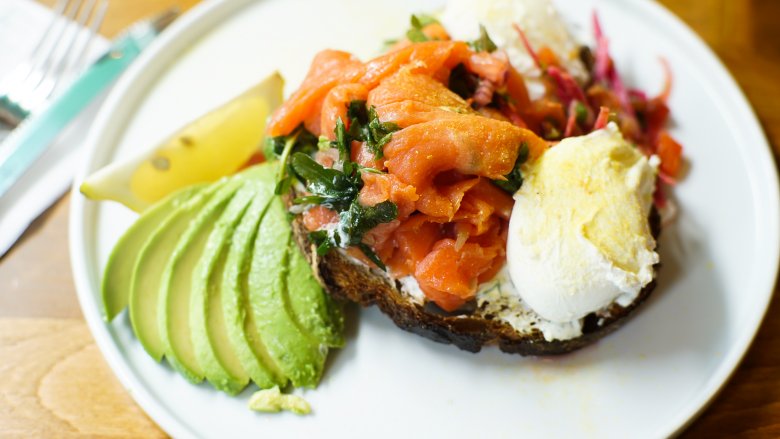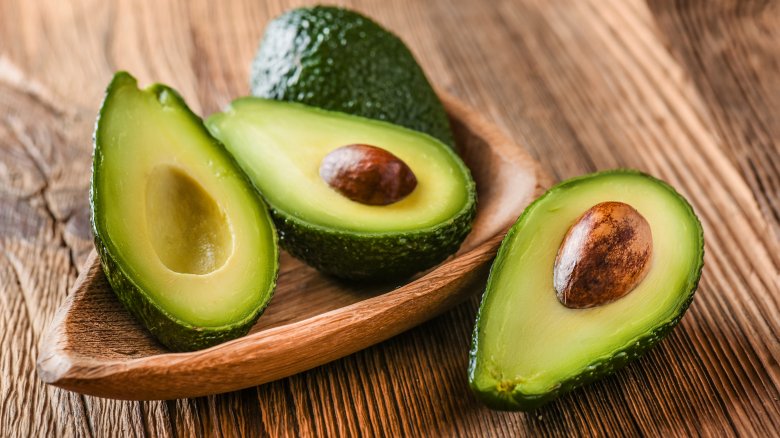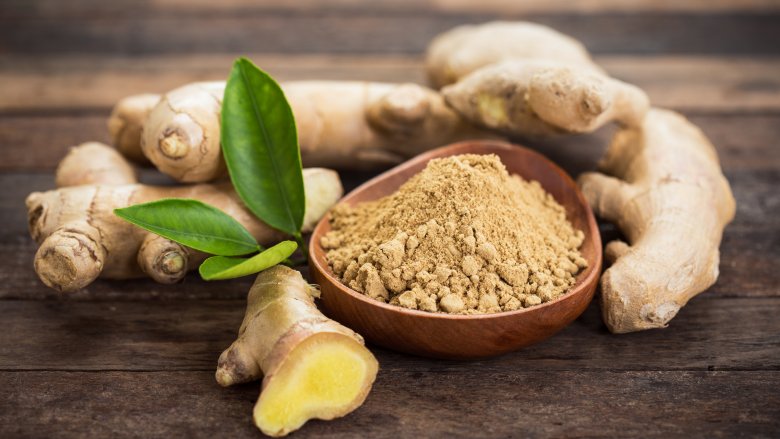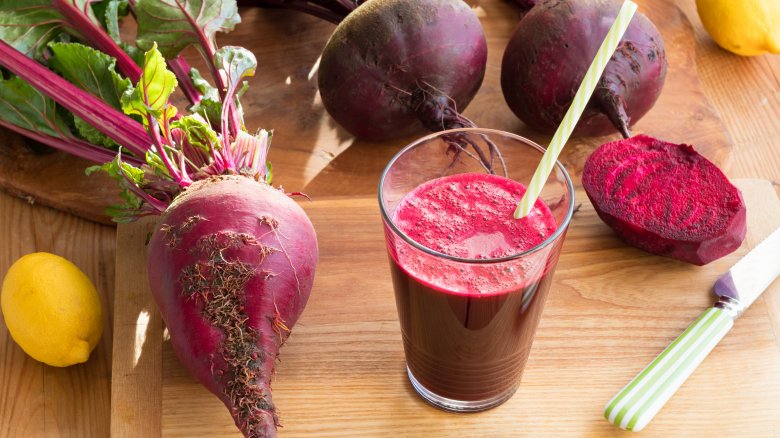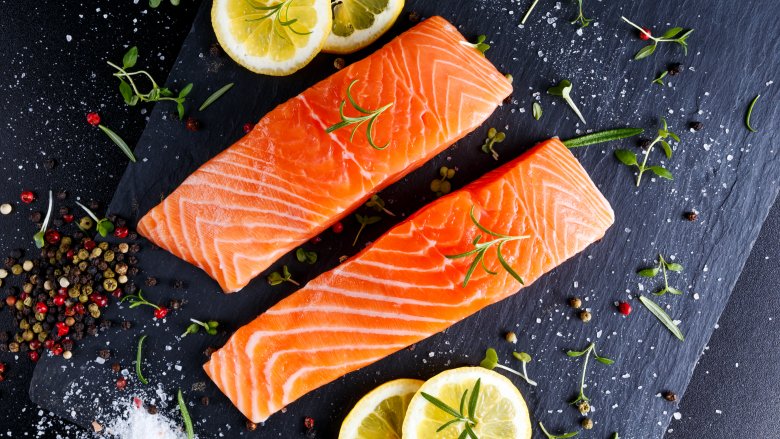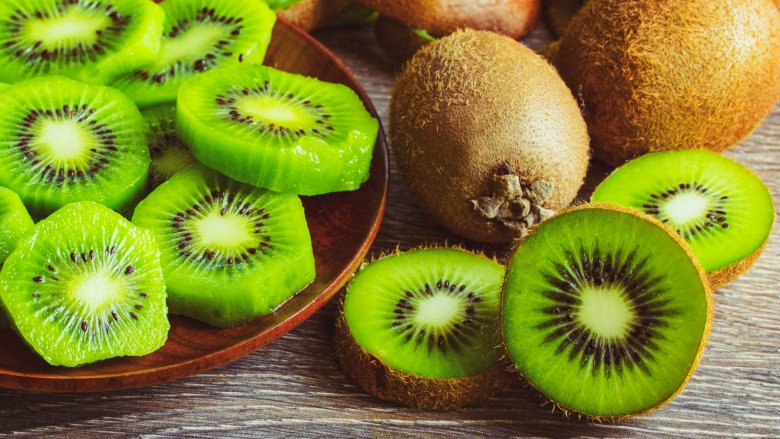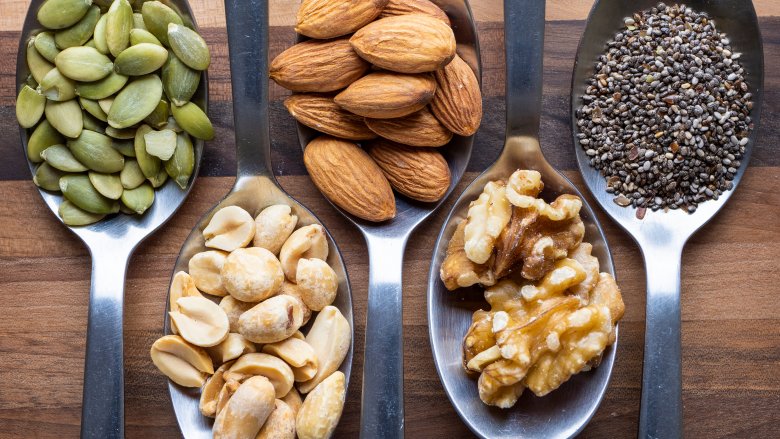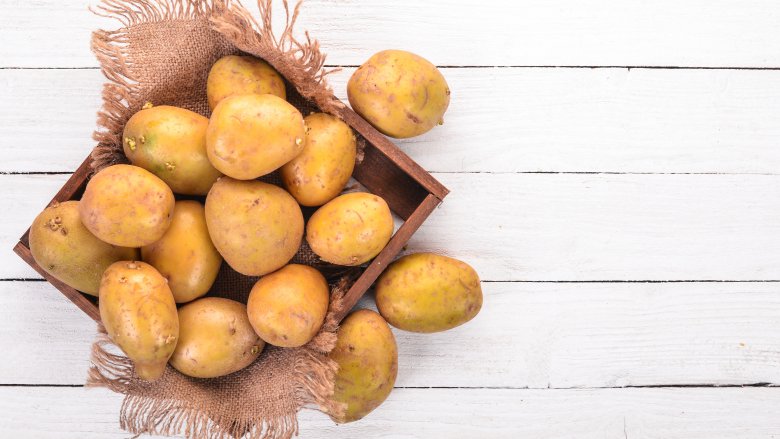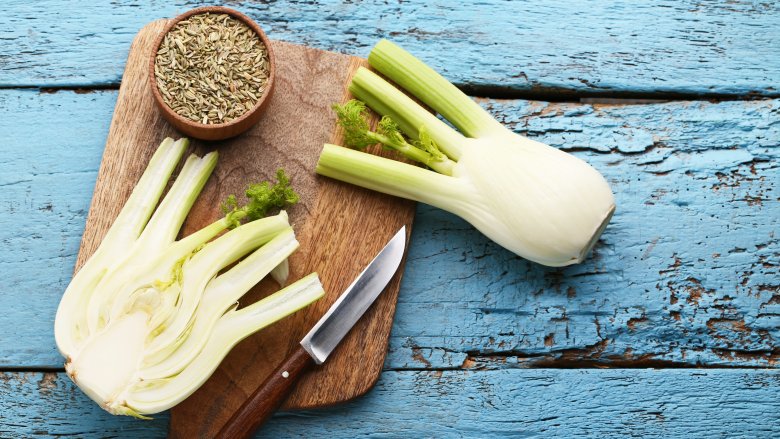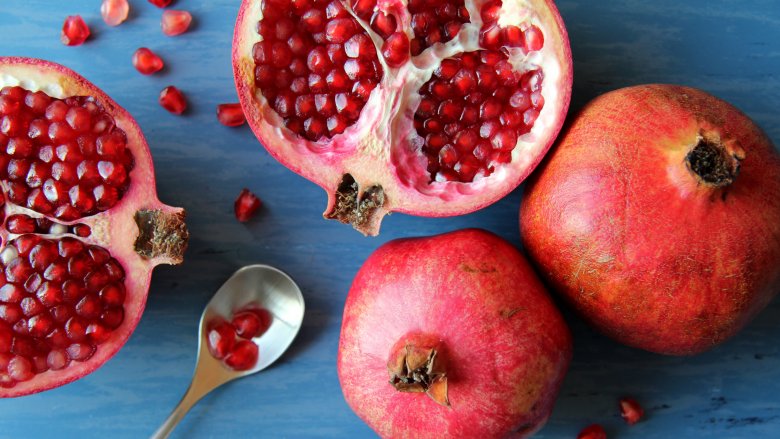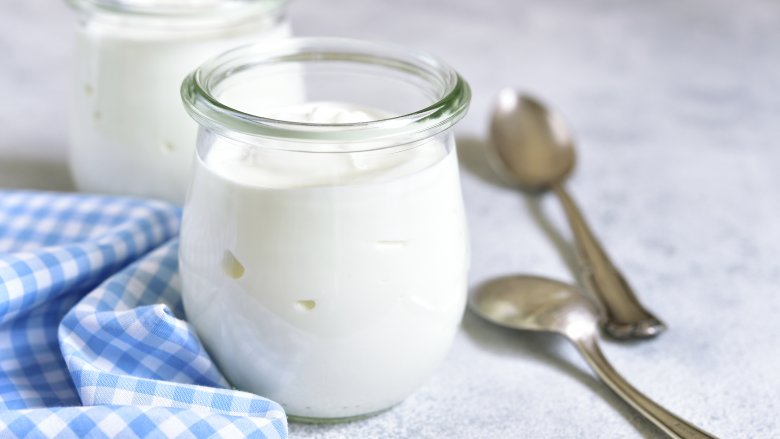The Best New Year's Resolution Foods To Start Eating For A Healthier Life
New Year's resolutions get a bum rap. We associate them with lofty goals that are rarely kept and the money we waste trying to achieve them. The secret to making the most of a New Year's resolution is to commit to giving something to yourself, rather than taking something away. For instance, instead of saying to yourself "I will lose weight this year," commit to adding more healthy foods into your diet that help you feel and look great from the inside out. If you end up losing a few pounds of body fat in the process, that's cool too! But you're not looking at your goal from the frame of mind that you're depriving yourself. That makes it a lot easier to stomach, doesn't it?
Adding more nutrient-dense foods to your diet is one of the best things that you can do for your overall health. Your average modern American may eat plenty, but their diets consisting of processed foods, refined grains, and plenty of added sugars leave them starving for the nutrients they need to be healthy. And despite what the vitamin supplement manufacturers will have you believe, nutrients are most effective when they come from food. To look and feel better in the new year, add the following healthy foods to support your best self.
Avocados
If itchy and dry winter skin is getting you down, go ahead and pay extra for that guacamole. Avocados are chock full of healthy, monounsaturated fatty acids (of the much coveted "healthy fats") that help moisturize your skin from the inside out. Getting plenty of avocados in your diet helps your skin stay supple and springy, reduces wrinkles, and helps reduce signs of aging from the sun. They're also packed full of vitamin C, which helps your skin make collagen and protects it from environmental damage.
Beyond their skin saving benefits, multiple studies have shown that avocados have either a cholesterol-lowering or cholesterol-neutralizing effect, which helps reduce your risk of coronary artery disease and heart attacks. Avocados are also rich in nutrients including vitamin K, potassium, and folate. If weight gain is a concern, don't go overboard with the alligator pears. According to the USDA, a standard avocado is 322 calories, so limiting yourself to one or one-half day should keep you within your ideal daily caloric intake.
Ginger
Add some fire to your body's immune system with a healthy helping of ginger in your diet. Ginger root has a warm, spicy bite, with just a touch of sweetness that adds a rich complexity to your favorite dishes. Best of all, ginger has both antiviral and antibacterial qualities to ward off bugs and keep you feeling fine throughout the sick season. It's important to note that studies show fresh ginger is more effective at fighting viruses compared to the dried version, so be sure to pick up the actual root in the produce section.
Studies have also shown that adding ginger to your diet (even in powdered form) may help lower your blood sugar levels, reduce your cholesterol, reduce some risks to heart disease, prevent or reduce age-related damage to the brain, and may even help prevent cancer. With all those benefits, you'll wish you'd added ginger to your diet a long, long time ago.
Beets
You don't need to do a "cleanse" to detoxify your body — that's your liver's job. But if you found yourself celebrating the holidays by knocking back more than a few cocktails and fatty meals, it definitely helps to give your liver a helpful boost so it can work more efficiently. Adding more beets to your diet does just that. Beets help your liver to detoxify more effectively — and a toxin-free body is more able to balance things like hormones, cholesterol, and energy levels.
Beets are also high in nitrates, which improves circulation and may even lead to improved blood pressure. Nitrates are also related to higher endurance — which means if another of your New Year's resolutions is to get in more exercise, beets could help. There's another, even more important benefit of that improved circulation, and that's better blood flow to your brain. One study of older adults showed that consuming beets led to more blood flow to the frontal lobe, which means better focus and more attention to detail.
Fatty fish
Shorter winter days (or even summer days spent indoors) mean you don't absorb enough sunlight to maintain healthy levels of vitamin D. A deficiency in vitamin D can affect your health in many ways including a loss of bone density, which can lead to fractures and osteoporosis. But in the winter, one of the more apparent signs of a vitamin D deficiency is feelings of depression. Studies show that vitamin D affects the production of serotonin and dopamine. When vitamin D levels fluctuate due to a lack of seasonally-available sunlight, it directly affects the levels of these important neurotransmitters that help regulate mood. Therefore, there is a direct association between vitamin D insufficiency and seasonal depression.
Fortunately, there are ways to naturally up your vitamin D levels with foods when the sun isn't shining so much. Of all the vitamin D-rich foods, fatty fish like salmon, mackerel, and tuna rank among the best. Furthermore, these fish are rich in omega-3 fatty acids, which supports healthy brain function, making it more effective at neurotransmitter production and mood regulation. So if you find yourself feeling blue this winter, try ordering in sushi or making a trip to your favorite fishmonger for a health mood boost.
Kiwi
Winter is known as "cold and flu season" because colder temperatures put stress on the body's immune system, making it more difficult to fight off germs and viruses. To buff up your immunity, eat more vitamin C-rich foods. Several important immune system cells — including helper T-cells – need plenty of vitamin C to do their jobs. If you're not getting enough of this important nutrient, your body is less resistant against certain pathogens, raising your risk of infection. And as humans are not able to synthesize our own, we have to consume plenty of it through vitamin C-rich foods.
Oranges have long been the poster child for vitamin C. But while these sunny citrus fruits are a rich source, kiwi offers more vitamin C relative to their size. Kiwi are also a rich source of free radical-fighting vitamin E, another important nutrient for a strong immune system. To get the most of kiwis, eat them raw by cutting one in half and scooping the flesh and seeds out with a spoon.
Nuts and seeds
Zinc is another important nutrient for immune system support. It helps with cell division and growth, wound healing, nutrient metabolism, and may provide some amount of defense against the common cold. Studies show that zinc-deficient patients experience severe immune dysfunctions.
The human body does not store zinc, so it needs to be consumed everyday. A common zinc source is animal protein — beef, pork, and lamb, in particular, have high levels of zinc. But for those who are trying to limit their meat consumption, extra zinc can be consumed via various nuts and seeds. Cashews are among the most popular of the zinc-rich nuts, with 11 percent of the recommended intake in a 28-gram serving. Hemp, pumpkin, and sesame seeds are also high in zinc — hemp seeds, in particular, contain 30-40 percent of the recommended daily intake in a 30-gram serving. Support a healthy immune system while giving your favorite soups and salads a much needed crunch by sprinkling various nuts and seeds on top.
Potatoes
Potatoes were the most popular vegetable in America as of 2012, but many of us are not getting the most from this hearty root vegetable because the majority of that consumption comes in some sort of fried variation. When properly prepared — think oven roasted, not deep-fried in fat — potatoes are a rich source of nutrients including vitamin C, potassium, vitamin B, magnesium, manganese, potassium, and phosphorous.
All that means potatoes may be great for lowering blood pressure, improving brain function, improving nervous system health, strengthening immunity, reducing inflammation, improving heart health, and even improving your skin.
Potatoes are a great source of fiber and resistant starch, both of which contribute to feelings of satiation at the end of the meal while promoting healthy digestion. To get the most from your spuds, mix up the types you buy at the store. Potatoes come in various sizes and colors including yellow, red, orange, and purple. Eating a variety of different types of potatoes keeps things interesting while providing an assortment of extra vitamins and minerals depending on the color of the vegetable.
Fennel
A healthy digestive system is beneficial for the entire body. When your system is running smoothly, it is better able to digest your food and properly allocate nutrients throughout the body. Fennel is a vegetable with edible seeds, bulb, stalks, and greens — and all of these parts support healthy digestion. In fact, it was listed as an official drug for indigestion in the United States. Fennel is considered a carminative, which is a food that helps prevent and relieve intestinal gas. Furthermore, it contains a high amount of the phytonutrient anethole, which is thought to reduce painful cramps that can occur during the digestive process.
As good as fennel is for the body, many people are at a loss when it comes to how to prepare, serve, and eat it. The Smithsonian highlights various ways to incorporate fresh fennel into your diet including using the stalks as a replacement for celery in aromatics, tossing the fronds in salads, and roasting the quartered bulbs for a side dish. Fennel seeds are also used to add subtle bittersweet flavor to recipes and in India the seeds are served as an end-of-meal treat to help aid digestion and freshen breath.
Eggs
Protein is a necessary nutrient for building strong bones and muscles while regulating your appetite, boosting metabolism, and reducing the risk of cardiovascular disease. Eggs are one of the best sources of protein out there. Not only are they incredibly nutritious, but eggs are also accessible, versatile, and relatively inexpensive when compared to other protein sources. And when you buy pasture-raised eggs, they are even healthier. According to a Penn State University study, eggs from pasture-raised hens contain higher levels of vitamins A, D, and E as well as more omega-3 fatty acids and beta carotene.
Adding more eggs to your diet is one of the healthiest things you can do. One egg contains almost every vitamin and mineral required by the human body including calcium, iron, potassium, zinc, manganese, folate, and vitamin E. Furthermore, a large egg is only 77 calories with a over 6 grams of quality protein. Note that most of the nutrition is contained in the yolk, so avoid eating the whites only unless your doctor advises you to.
Pomegranate
In the Greek legend of Persephone, the demigoddess and Queen of the Underworld ate pomegranate seeds to ensure that she could return to Hades after she finished helping her mother Demeter, the goddess of the harvest, restore crops after the famine of winter. As she ate half of the seeds, it was decided that she'd spend six months on earth (spring and summer) and then return to Hades for the residual six months (fall and winter). Thus, we have the balance of the seasons.
Eating pomegranate in the winter, as Persephone did, can be a symbolic gesture assuring the return of spring and all living things. But even if you don't care about mythology at all, the pomegranate's seeds are chock full of a type of antioxidants called polyphenols that protect your cells against the effects of free radicals. Free radicals contribute to the aging process and may be linked to diseases including cancer, diabetes, and heart disease. Eating a diet rich in antioxidants helps fight off free radicals for longevity and health. Furthermore, pomegranates — like their similarly-crimson cousin beets — protect the body's levels of nitric oxide which supports a healthy cardiovascular system and optimal blood flow.
Fermented foods
Your gut is home to billions of bacteria and other microorganisms that contribute to everything from your allergies to your mental health. Keeping your microbiome healthy and balanced ensures total body health and wellness. Feeding the good bacteria with plenty of prebiotic-rich foods – apples, oats, and garlic are all good sources — is one way to maintain a healthy gut, but it's not enough. Humans need to eat fermented foods that are rich in probiotics for optimal gut health.
Fermented foods contain tons of good bacteria that help improve digestion. Science is finding that when your body is able to fully digest and utilize the energy and nutrients from the food you eat, you enjoy better mental health, as well. While there are plenty of probiotic supplements on the market, nothing beats getting the good stuff straight from the source. Try adding more fermented foods such as yogurt, sauerkraut, kimchi, pickles, raw apple cider vinegar, and kombucha to your diet. The more you eat them, the more you'll get used to their vinegar-y taste. In fact, many people claim they start craving fermented foods once they start enjoying them on a regular basis.
